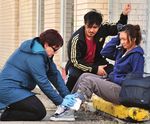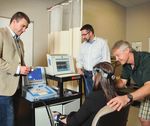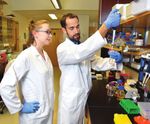RESEARCH STRENGTHS UNIVERSITY OF REGINA - ANXIETY, STRESS & PAIN DIGITAL FUTURE INTEGRATED HUMAN HEALTH: EQUITY, DISEASE & PREVENTION
←
→
Page content transcription
If your browser does not render page correctly, please read the page content below
UNIVERSITY OF REGINA
RESEARCH
STRENGTHS
ANXIETY, STRESS & PAIN
DIGITAL FUTURE
INTEGRATED HUMAN HEALTH: EQUITY, DISEASE & PREVENTION
SOCIAL JUSTICE & COMMUNITY SAFETY
WATER, ENVIRONMENT & CLEAN ENERGY
2016-2021he University of Regina has emerged as a centre of
excellence on a number of research fronts. Based upon
research impact, critical mass of highly qualified personnel,
distinctiveness, and commitment to partners in the community
and the Province of Saskatchewan for high impact research,
we have established five areas of research strength:
Anxiety, Stress & Pain | Digital Future | Integrated Human
Health: Equity, Disease & Prevention | Social Justice &
Community Safety | Water, Environment & Clean Energy
These areas of strength showcase our extraordinary research
achievements, and our capacity to make positive changes in
society and to expand new knowledge.
The University of Regina is a research-
intensive institution that currently
leads Canadian comprehensive
universities in research impact and
1
international research collaboration .
2
1
Thomson Reuters’ NCI
2
Research InfoSourceANXIETY, STRESS & PAIN DIGITAL FUTURE
Pain, anxiety, depression and stress can be understood as Digital Future researchers are leading the way through
being part of a vicious, self-perpetuating cycle. Understanding, innovation and creativity in computing and digital media.
evaluating and managing this cycle is the focus of this area They are performing research in data mining; wise computing,
of research. visualization, data security and policy; design, creation and
analysis of emerging technologies and within the digital
Our researchers are tackling complex and costly human
humanities. They are emphasizing effective, efficient and
problems related to anxiety, stress and pain with the ultimate
sensitive decision-making by working with new information
goal of improving functional ability and quality of life for
accumulated from diverse sources in scaled quantities
millions of people.
of heterogeneous and electronic data.
Specific areas of focus include investigating ways of evaluating
The growth and continuous expansion of the data culture
pain in people with severe dementia, pioneering the study of
provides constant opportunities for our researchers
the co-occurrence of pain and post-traumatic stress disorder
to innovate, partner, develop and produce across fields
(PTSD), and leading the way toward improved access to mental
such as commerce, science, education, healthcare, public
health care for anxiety, depression and pain through Internet-
administration and the arts and culture industries. Results
delivered Cognitive Behaviour Therapy (ICBT).
of data analytics are being applied to local businesses with
A multi-disciplinary team researches Exploring society’s relationship with data by riding, virtually, international reach, health (especially e-health), policing
physiological responses to stress. from coast to coast using Google Street View technology. and government data sets for policy initiatives.
The University of Regina research team has successfully helped GasBuddy to move from ideas to prototypes
Innovation is at our core and research is one of the keys to innovation. The University
and then move these prototypes to implementation. They provided us with a method for validating gas
of Regina has helped us move forward, faster by connecting us with researchers and
prices that is now used in GasBuddy software and run more than a million times a day. We’ve also had the
unlocking the potential of innovative ideas.
chance to work with, and then hire, great students. This relationship has been very rewarding.
ISM CANADA , AN IBM COMPANY
GASBUDDYThe Regina Police Service has been fortunate to build, sustain, and foster
relationships with academics at the University of Regina. Working together has
allowed for opportunities to increase knowledge through evidence based and
objective research, analysis, and evaluation. In an ever-changing environment,
collaboration with researchers at the University of Regina has improved the
validity and credibility of policing services in our community.
REGINA POLICE SERVICE
The connection to the University of Regina and the resources available there,
as well as the opportunity they gave us to interact with other community
organizations and researchers was invaluable.
ASSOCIATION OF TRANSITION HOUSES & SERVICES SASKATCHEWANINTEGRATED HUMAN HEALTH: SOCIAL JUSTICE &
EQUITY, DISEASE & PREVENTION COMMUNITY SAFETY
The main objective of this area of study is to develop and Work being done in this area involves research
disseminate research knowledge in order to improve the and practice focused on equity and fairness at
health of Canadians. Researchers in this area perform clinical, both individual and systemic levels. It considers
bio-medical, population and Indigenous health research, using inequities in social, political and economic power,
methodologies from the natural, clinical and social sciences. equitable access to opportunities and resources,
This integrated health approach focuses not only on traditional as well as scholarship that involves reciprocal
biochemical/biomedical research, but also investigates social, University-community engagement. It also includes
political, economic, cultural and population aspects of health. research that deals with prevention and protection of
communities from circumstances or events that could
This cluster serves as a focal point for promoting interactions
place the safety of individuals or groups in jeopardy.
between researchers, clinicians, policy makers, and the public.
It provides a resource for local community interactions and Researchers in this area study a diverse array of
information on health research. Research in this area has focused topics such as critical theory, labour studies, human
on a variety of critical issues, including understanding antibiotic rights, Indigenization, post/anti-colonialism, social
resistant microbes and developing the diagnostic tools required services, worker safety and worker rights, bullying,
to deal with them. Researchers have also helped influence community engagement, corrections, genocide,
Understanding antibiotic resistance and changes in policy, program, health care and clinical practice Research focused on bringing nursing law and law enforcement, emergency preparedness
developing diagnostic tools to deal with it. and created community capacity that empowers it to change to the community. and victimization.
its own health outcomes.
In our Saskatchewan Plan for Growth, we highlight our government’s goal to show leadership
The independent evaluation of the Regina Mental Health Court completed by researchers
through new research in nuclear medicine, nuclear materials science and other areas. This is why
at the University of Regina is the cornerstone upon which a new and more humane
we are pleased to fund collaborative innovative projects at the University of Regina – to advance
approach to the mentally ill in conflict with the law will be built in Saskatchewan.
our province and ultimately create a better quality of life for all Saskatchewan people.
JUDGE CLIFFORD TOTH
HONOURABLE JEREMY HARRISON, MINISTER RESPONSIBLE FOR INNOVATIONWATER, ENVIRONMENT
& CLEAN ENERGY
The focus of this area of research is identifying the most serious threats
to environments in semi-arid regions in Saskatchewan and elsewhere,
providing information to decision makers on how to alleviate negative
impacts of climate, land-use and pollution on hydrology, water quality
and food-web integrity, and developing adaptive management strategies
and policies for the impacts of anticipated climate change, population
growth, and increased development of natural resources.
Researchers in this area evaluate the impacts of natural and human
effects on grassland, forest and aquatic habitats, develop environmental
We have a thirst to know the unknown.
low carbon technologies to mitigate carbon dioxide emissions associated
with climate change, and study other aspects of clean energy such
as smart grids, intelligent transportation systems, as well as lean and
To our researchers, our investigation of, and reflection upon,
agile manufacturing.
intellectual pursuits is fundamental. We engage our students in
The “Clean Energy” component provides global leadership in carbon
Studying the impacts of the
capture and other low clean energy research activities. Researchers in these pursuits, seeking to instil in them a lifelong quest for knowledge
this area have become the go-to resource group on all issues relating
climate phenomenon El Niño. to carbon capture. and understanding. We encourage an active and innovative research
enterprise that expands the boundaries of knowledge, yet has
a meaningful impact at home and around the globe.
Simply put, the University of Regina is one of Canada’s top research impact universities. The data demonstrates
clearly that the quality of our work is globally respected. The take home message is that if quality over quantity – From the University of Regina Strategic Plan 2015-2020: peyak aski kikawinaw (Together we are stronger)
is important, then this is the place for all of our stakeholders to invest time and resources.
D R . D A V I D M A L L O Y, V I C E - P R E S I D E N T ( R E S E A R C H )PARTNER WITH US
The University of Regina welcomes research partnerships with a wide range
of partners including individuals, communities, governments, NGOs, other
academic and research institutions, businesses, and industry. If you are
interested in partnering with the University of Regina or if you are a researcher
looking for assistance in finding an external research partner, please contact:
Divyesh Patel, Manager, Research Partnerships
Ph: (306) 337-3293 • E: divyesh.patel@uregina.ca
For more information on each of our research strengths, please visit:
www.uregina.ca/research/research-expertise/research-strengths
The Office of the Vice-President (Research)
David Malloy, PhD, Vice-President (Research)
Administration-Humanities Building 526, University of Regina
3737 Wascana Parkway, Regina, SK S4S 0A2
Phone: 306-585-5184 • Fax: 306-585-5255
E-mail: VP.Research@uregina.ca
www.uregina.ca/research/You can also read



























































